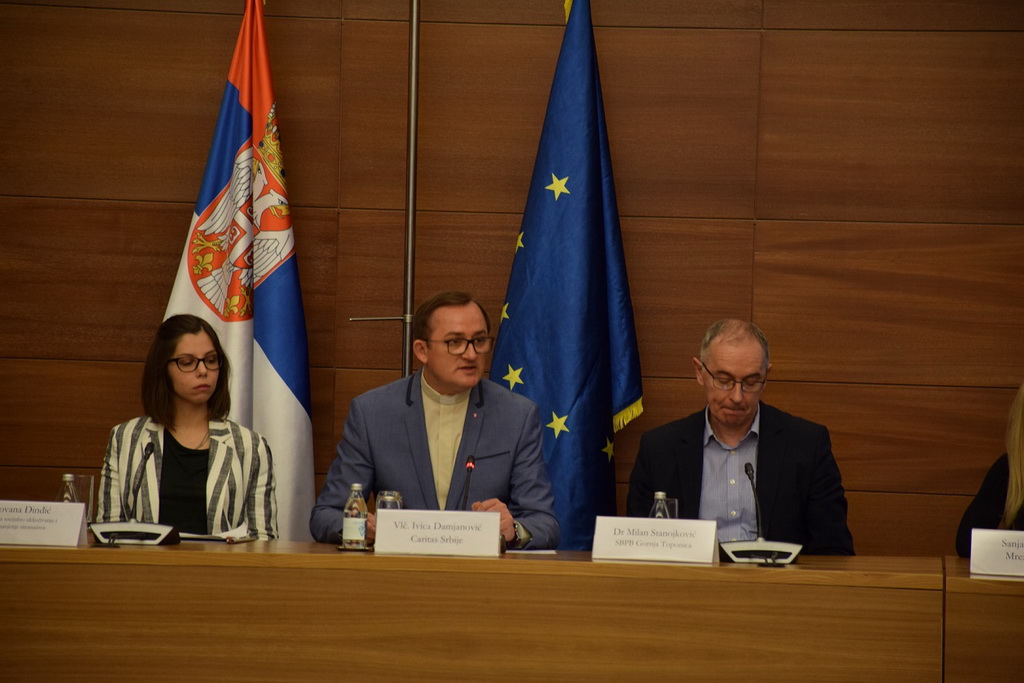 The National Forum “Social Inclusion of Persons with Disabilities and Persons with Mental Impairments” was held at the Deputy’s Club in Belgrade, on Wednesday, 10 April.
The National Forum “Social Inclusion of Persons with Disabilities and Persons with Mental Impairments” was held at the Deputy’s Club in Belgrade, on Wednesday, 10 April.
The forum was organized with the support of the Ministry of Health of the Republic of Serbia by Caritas Serbia and the association “Naša kuća”, as part of the regional EU project SOCIETES.
The forum was attended by around one hundred participants, representatives of international institutions and organizations (EU, UN, Red Cross…), state bodies (ministries, Ombudsman, Commissioner for the Protection of Equality, National Employment Service…), healthcare institutions (all 5 specialized hospitals for psychiatric diseases, Institute for Mental Health, KBC Zvezdara…), educational institutions (Faculty of Philosophy, Faculty of Political Science, FASPER…), social protection institutions and civil society organizations, including organizations of persons with disabilities and mental impairments.
 During the plenary segment of the event the issues of social inclusion and set goals were discussed by: the Belgrade Archbishop Msgr. Stanislav Hočevar, President of Caritas Serbia; representative of the EU Delegation to Serbia Leonetta Pajer; Assistant Minister of Health for European Integration and International Cooperation Dr Danijela Urošević; rev. Ivica Damjanović, Director of Caritas Serbia; Jovana Đinđić, Coordinator for Gender Equality and Human Rights in the Social Inclusion and Poverty Reduction Unit of the Government of the Republic of Serbia (SIPRU); Biljana Zekavica, representative of the Ministry of Labour, Employment, Veteran and Social Affairs, Sector for Family Care and Social Welfare; Dr Milan Stanojković, chairman of the Working Group of the Ministry of Health for drafting a new strategy on mental health; Ivanka Jovanović, Executive Director of the National Organization of Persons with Disabilities of Serbia (NOOIS); Sanja Trifunović, representative of the Network for Mental Health NaUm.
During the plenary segment of the event the issues of social inclusion and set goals were discussed by: the Belgrade Archbishop Msgr. Stanislav Hočevar, President of Caritas Serbia; representative of the EU Delegation to Serbia Leonetta Pajer; Assistant Minister of Health for European Integration and International Cooperation Dr Danijela Urošević; rev. Ivica Damjanović, Director of Caritas Serbia; Jovana Đinđić, Coordinator for Gender Equality and Human Rights in the Social Inclusion and Poverty Reduction Unit of the Government of the Republic of Serbia (SIPRU); Biljana Zekavica, representative of the Ministry of Labour, Employment, Veteran and Social Affairs, Sector for Family Care and Social Welfare; Dr Milan Stanojković, chairman of the Working Group of the Ministry of Health for drafting a new strategy on mental health; Ivanka Jovanović, Executive Director of the National Organization of Persons with Disabilities of Serbia (NOOIS); Sanja Trifunović, representative of the Network for Mental Health NaUm.
The participants have agreed that lack of information, prejudice and stigmatization represent the greatest obstacles for the social inclusion of persons with disabilities, particularly persons with intellectual and mental impairments. The great importance of media was noted in creating public views on this vulnerable category of persons. Proposals included more efficient education on health, primarily for the youngest children, with the proposal of introducing health education as a mandatory subject in schools. The lack of social welfare services in the community and multisectoral cooperation have also been noted as significant barriers in the implementation of social inclusion and de-institutionalization, with particular emphasis on the need for better cooperation between the Ministry of Health and the Ministry of Labour, Employment, Veteran and Social Affairs. The forum also discussed issues of employment, as the core of social inclusion of persons with disabilities.
Source: caritas.rs
 Government of the Republic of Serbia
Government of the Republic of Serbia















 pdf [271 KB]
pdf [271 KB]
Leave a Comment